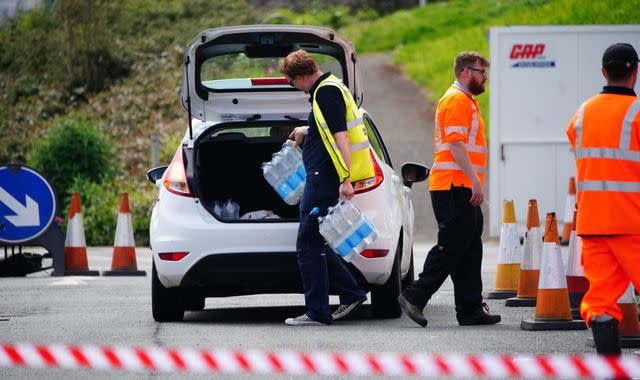Brixham: More than 50 people in Devon ill from contaminated water - as South West Water's owner posts £166m profit

More than 50 cases of cryptosporidium have been confirmed in Brixham, the Devon town where around 17,000 households have been told to boil their drinking water, health bosses have said.
The UK Health Security Agency (UKHSA) said on Tuesday 57 people had been affected, a rise of 11 cases since Friday, and said more cases are expected to be confirmed this week.
It comes on the day Pennon Group, the parent company of South West Water (SWW), which supplies the area and has apologised for the outbreak, announced an 8.6% increase in underlying operating profits to £166.3m.
Explainer: What is crytosporidium?
Earlier, Pennon Group said about £3.5m in compensation will be paid to customers affected by the parasite outbreak - after raising the amount to £215 for impacted customers.
Around 17,000 households in the Brixham area have been told to boil their drinking water since last week following an outbreak of cryptosporidiosis - a waterborne disease which can cause unpleasant symptoms such as diarrhoea and vomiting.
On Saturday afternoon, SWW lifted the boiling restrictions for 14,500 homes after water quality monitoring results found no traces of cryptosporidium in the Alston supply area.
However, the water company said some 2,500 properties in the Hillhead supply area should continue to boil their supply before drinking it.
"The health and safety of our customers remains our absolute priority," the company said in a statement.
"Early yesterday morning, we began flushing of the wider Hillhead network as we work to eliminate any traces of cryptosporidium.
"We will not lift the boil water notice in Hillhead until we and our public health partners are completely satisfied it is safe to do so."
Cryptosporidiosis is caused by a water-born parasite - cryptosporidium. SWW has said the outbreak was most likely triggered by animal faeces entering a damaged pipe.
It can take between two and 10 days for people to become ill after being exposed, the UKHSA said, so the cases confirmed on Tuesday are those who became unwell before the issue was identified and SWW took steps to end the outbreak.
On Friday, the UKHSA said it was investigating 70 other cases of diarrhoea and vomiting.
Sarah Bird, consultant in health protection for UKHSA South West, said: "South West Water have identified the likely source of the outbreak and are working hard to resolve the issue.
"The data shows the outbreak is associated with people who live in, or have visited the boil water notice area of Brixham and the nearby areas.
"A boil water notice remains in place for a number of residents, and South West Water have a postcode checker on their website for people to check if they are affected.
Ms Bird urged people to wash their hands with hot soapy water, as alcohol hand gel is not enough to kill cryptosporidium.
She said: "Those with symptoms should stay off nursery, school and work for 48 hours since the last episode of illness, and anyone with diarrhoea should not go swimming for 14 days after their last episode of illness.
"This is really important to stop further spread of the illness from person to person."
Read more:
People still scared to drink tap water after disease outbreak
Contamination 'shouldn't have happened' - water boss
Dr Lincoln Sargeant, Torbay Council's Director of Public Health, said: "For those areas still subject to the boil water notice, we continue to support local businesses to operate safely. It is important to emphasise that the outbreak has only affected a small area of Torbay and we remain open for business."
A local MP has called on Pennon to suspend dividend payments to shareholders in the wake of the outbreak.
Anthony Mangnall, the Conservative MP for Totnes, said it was "hugely disappointing" that, with public confidence in South West Water "at an all-time low", Pennon had "decided to go ahead and pay out dividends".
He said: "I have called for Pennon to suspend their dividend offering, which they can do, which they are able to do... If they fail to do so, the chief executive should take the rap for this."


